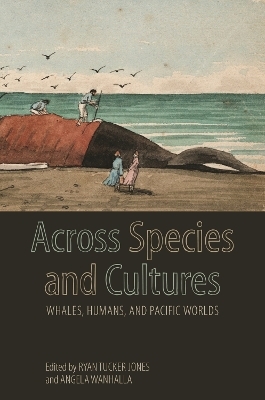
Across Species and Cultures
Whales, Humans, and Pacific Worlds
Seiten
2023
University of Hawai'i Press (Verlag)
978-0-8248-9282-1 (ISBN)
University of Hawai'i Press (Verlag)
978-0-8248-9282-1 (ISBN)
Offers for the first time a critical, wide-ranging geographical and temporal look at the varieties of whale histories in the Pacific. The contributors, from around the Pacific, present a wealth of fascinating stories while breaking new methodological ground in environmental history, women’s history, animal studies, and Indigenous ontologies.
More than any other locale, the Pacific Ocean has been the meeting place between humans and whales. From Indigenous Pacific peoples who built lives and cosmologies around whales, to Euro-American whalers who descended upon the Pacific during the nineteenth century, and to the new forms of human-cetacean partnerships that have emerged from the late twentieth century, the relationship between these two species has been central to the ocean’s history. Across Species and Cultures: Whales, Humans, and Pacific Worlds offers for the first time a critical, wide-ranging geographical and temporal look at the varieties of whale histories in the Pacific. The essay contributors, hailing from around the Pacific, present a wealth of fascinating stories while breaking new methodological ground in environmental history, women’s history, animal studies, and Indigenous ontologies. In the process they reveal previously hidden aspects of the story of Pacific whaling, including the contributions of Indigenous people to capitalist whaling, the industry’s exceptionally far-reaching spread, and its overlooked second life as a global, industrial slaughter in the twentieth century.
While pointing to striking continuities in whaling histories around the Pacific, Across Species and Cultures also reveals deep tensions: between environmentalists and Indigenous peoples, between ideas and realities, and between the North and South Pacific. The book delves in unprecedented ways into the lives and histories of whales themselves. Despite the worst ravages of commercial and industrial whaling, whales survived two centuries of mass killing in the Pacific. Their perseverance continues to nourish many human communities around and in the Pacific Ocean where they are hunted as commodities, regarded as signs of wealth and power, act as providers and protectors, but are also ancestors, providing a bridge between human and nonhuman worlds.
More than any other locale, the Pacific Ocean has been the meeting place between humans and whales. From Indigenous Pacific peoples who built lives and cosmologies around whales, to Euro-American whalers who descended upon the Pacific during the nineteenth century, and to the new forms of human-cetacean partnerships that have emerged from the late twentieth century, the relationship between these two species has been central to the ocean’s history. Across Species and Cultures: Whales, Humans, and Pacific Worlds offers for the first time a critical, wide-ranging geographical and temporal look at the varieties of whale histories in the Pacific. The essay contributors, hailing from around the Pacific, present a wealth of fascinating stories while breaking new methodological ground in environmental history, women’s history, animal studies, and Indigenous ontologies. In the process they reveal previously hidden aspects of the story of Pacific whaling, including the contributions of Indigenous people to capitalist whaling, the industry’s exceptionally far-reaching spread, and its overlooked second life as a global, industrial slaughter in the twentieth century.
While pointing to striking continuities in whaling histories around the Pacific, Across Species and Cultures also reveals deep tensions: between environmentalists and Indigenous peoples, between ideas and realities, and between the North and South Pacific. The book delves in unprecedented ways into the lives and histories of whales themselves. Despite the worst ravages of commercial and industrial whaling, whales survived two centuries of mass killing in the Pacific. Their perseverance continues to nourish many human communities around and in the Pacific Ocean where they are hunted as commodities, regarded as signs of wealth and power, act as providers and protectors, but are also ancestors, providing a bridge between human and nonhuman worlds.
Ryan Tucker Jones is Ann Swindells Associate Professor in the Department of History at the University of Oregon. Angela Wanhalla is associate professor in the Department of History and Art History at the University of Otago.
| Erscheinungsdatum | 06.03.2023 |
|---|---|
| Reihe/Serie | Asia Pacific Flows |
| Zusatzinfo | 29 b&w illustrations |
| Verlagsort | Honolulu, HI |
| Sprache | englisch |
| Maße | 152 x 229 mm |
| Gewicht | 363 g |
| Themenwelt | Sachbuch/Ratgeber ► Geschichte / Politik ► Allgemeines / Lexika |
| Geisteswissenschaften ► Geschichte ► Regional- / Ländergeschichte | |
| Naturwissenschaften ► Biologie ► Ökologie / Naturschutz | |
| Naturwissenschaften ► Biologie ► Zoologie | |
| Sozialwissenschaften ► Ethnologie | |
| Sozialwissenschaften ► Soziologie | |
| ISBN-10 | 0-8248-9282-8 / 0824892828 |
| ISBN-13 | 978-0-8248-9282-1 / 9780824892821 |
| Zustand | Neuware |
| Haben Sie eine Frage zum Produkt? |
Mehr entdecken
aus dem Bereich
aus dem Bereich
die Reise der Menschheit : zwischen Aufbruch und Scheitern
Buch | Softcover (2023)
Ullstein Taschenbuch Verlag
CHF 20,95


